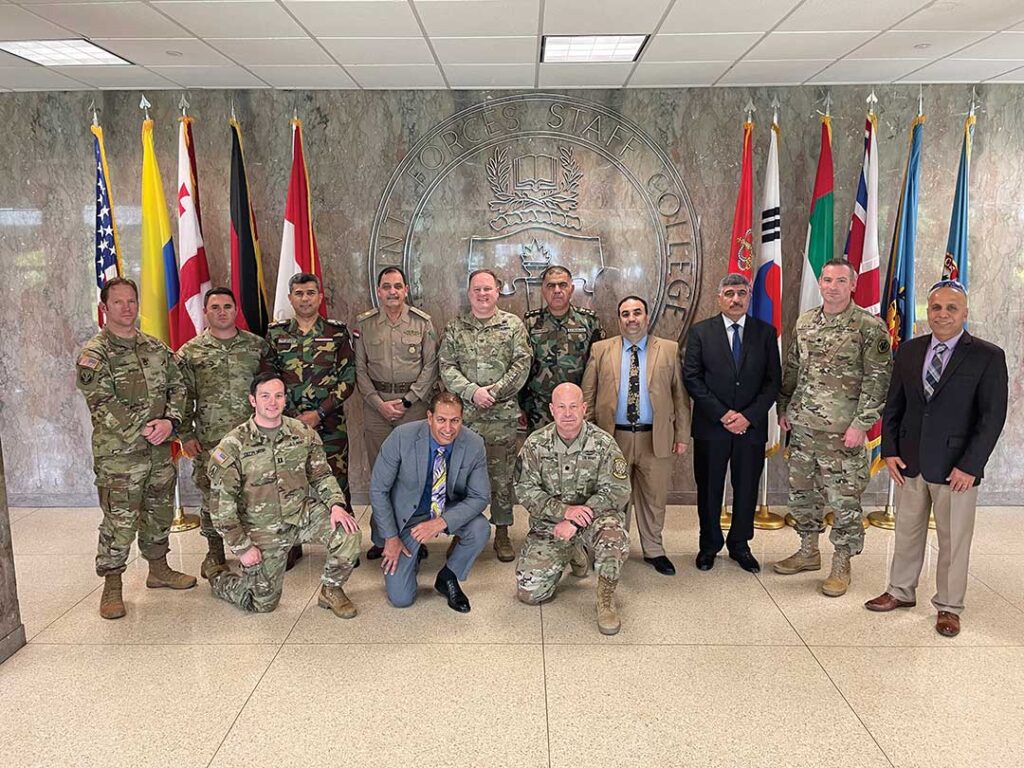Not long after the United States announced it would refocus its mission in Iraq to an advise, assist and enable function, an Iraqi delegation arrived in the U.S. to share its successful ideas and seek consultation on a topic critical to its ongoing struggle against violent extremism: How to conduct media campaigns against terrorists who wage online ideological warfare.
The delegates came from a variety of ministries, but shared commitment to improving Iraqi messaging in the battle against these media-savvy terrorists united them. They included Maj. Gen. Yahya Rasool, director of Media and Moral Guidance in the Iraqi Ministry of Defense, Maj. Gen. Saad Maan, director of the Iraqi Security Media Cell and Maj. Gen. Othman Mustafa, director of Media and Public Awareness in the Ministry of Peshmerga.
Also part of the delegation were two civilians engaged in Iraqi security: Dr. Hussein Alawi, advisor to the Iraqi prime minister, and Mr. Sabah Nouri, Iraqi Counter-Terrorism Service (CTS) spokesman and advisor to the CTS commander.
It’s noteworthy that this event was part of a series of exchanges to increase cooperation and understanding of information-related threats from adversaries.
The first stop was the headquarters of U.S. Central Command (CENTCOM) in Florida, where the Iraqis held discussions with senior U.S. military commanders and observed CENTCOM’s internet and media operations. The Iraqis received reassurances that Iraqi peace and security remains a top priority for U.S. partners.
The Iraqis then traveled to the Joint Command, Control and Information Operations School at the U.S. National Defense University in Virginia.
The Iraqis were intrigued by the possibilities of intensifying cooperation with the U.S. in information operations after the U.S. relinquished any combat role in the country in December 2021.
Maj. Gen. Yahya recalled the battles to liberate Iraq from the depravity of Daesh, when the Media and Moral Guidance Directorate of the Ministry of Defense worked with U.S. and multinational forces to craft professional media campaigns to counter hostile propaganda. He would like such cooperation to continue.
“Our interest was strengthened in the information operations program at the National Defense University, and we are in great need of such programs that are of critical importance to specialists in that field,” Gen. Yahya said after the visit. “In Iraq, we need training and development to reach the level of U.S. forces in this field.”
Maj. Gen. Maan runs the Security Media Cell, which is responsible for refuting terrorist narratives and promoting accurate storylines in their place. He praised the continuing aid and assistance provided by U.S. Central Command in the counterterrorism sphere, including the Extremist Discourse Monitoring Department the Iraqis maintain in Baghdad.
“The partnership between the Security Media Cell and the Coalition Forces is strong and solid and is based on the foundations of professionalism, ongoing cooperation, and high-level coordination to achieve the primary objective of defeating Daesh and sustaining security and stability in Iraq and the region,” he said.
“The most important point of cooperation between the Security Media Cell and Coalition Forces is in the analysis of terrorist communication and exposing the lies of Daesh on social media.”
Speaking for the Iraqi Counter-Terrorism Service, Nouri stressed how the media analysis conducted by CENTCOM to identify and counter extremist content complements the activities of the Iraqis.
“The ideas that we discussed during the visit were very important, and Central Command’s views were unified and positive in diagnosing and identifying strategic cooperation frameworks in the field of countering extremist ideology and in supporting the Iraqi government,” Nouri noted.
Cyberwarfare and online indoctrination remain great threats not only to Iraq, but also the region and the world, Maj. Gen. Othman said. He urged Iraq and the U.S. to work as a team to combat radical ideologies that have sown terror and intimidation in society.
“The physical war against Daesh is over, but a new war has emerged, which is media and psychological warfare. This war requires us to join forces and capabilities to confront it,” he said.
The Kurdish major general praised Central Command’s Information Operations Center and threw his support behind opening a similar operation in Iraqi territory. Exposing terrorist thought — and its toxic byproducts such as child recruitment in refugee camps — requires a regional effort.
“There are similar centers in allied nations in the Middle East such as Saudi Arabia and the United Arab Emirates. Viewing the U.S. center’s work was a new experience for me, and it is important and critical,” he said.
Maj. Gen. Maan viewed the trip to the U.S. as a fruitful product of a continuing partnership in which consultations will play the biggest role.
“There is no doubt that exchanging experiences with friends at Central Command has brought many benefits to both sides and has strengthened the bonds of trust and joint action,” he said.
“The last visit was very rewarding and it achieved a lot in terms of cooperation. During each visit, we learn about important programs and a new task force which made us aspire to develop our capabilities in countering terrorist discourse.”

